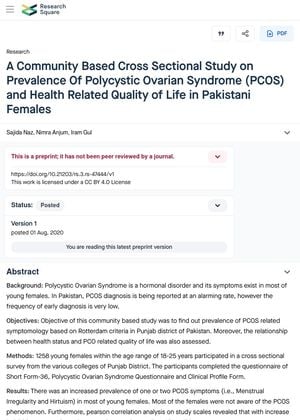A Community-Based Cross-Sectional Study on Prevalence of Polycystic Ovarian Syndrome and Health-Related Quality of Life in Pakistani Females
August 2020
in “
Research Square (Research Square)
”

TLDR Many young women in Punjab, Pakistan, show symptoms of PCOS and have a lower quality of life, but they are not aware of the condition.
In 2020, a community-based cross-sectional study was conducted on 1258 young females aged 18-25 years in the Punjab district of Pakistan to determine the prevalence of Polycystic Ovarian Syndrome (PCOS) symptoms based on the Rotterdam criteria. The study found an increased prevalence of one or two PCOS symptoms, specifically menstrual irregularity and hirsutism, in most of the participants. However, most of these females were not aware of PCOS. The study also found a correlation between increased PCOS symptomology and a poorer quality of life. The researchers concluded that despite being educated, most females were largely unaware of PCOS symptoms, suggesting a need for educational seminars to promote awareness about risk factors, which could contribute to early diagnosis and prevention.





